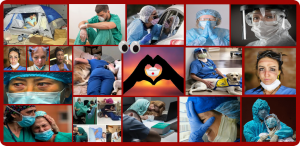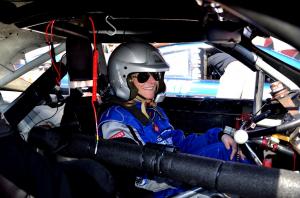Nurse Argues Early Life Predictions of a Bleak Iowa Future Were Mistaken; Claims Destiny Makes Exceptions For Nurses
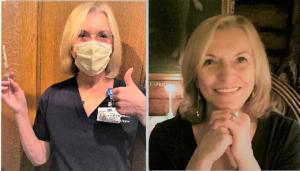
Pamela Jane Nye, CEO/Neuroscience Nursing, Ltd; Founder/CEO/Exec. Director of Operation Scrubs, Inc. nonprofit; aka: "The Vaccinator"
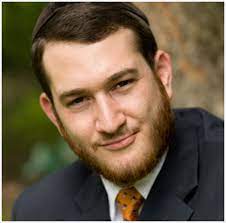
Yitzi Weiner, an established positive influencer, Founder & Editor of Authority Magazine, and CEO of Thought Leader Incubator.
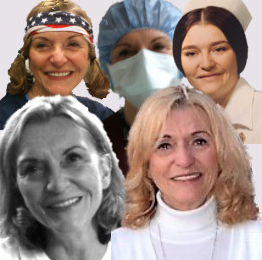
Pamela Nye: From Iowa obscurity to acclaimed nurse, CEO/Board Chair/Exec. Director of Operation Scrubs, Inc.. and President/CEO of Neuroscience Nursing, Ltd.
If destiny exceptions for nurses really existed, Authority Magazine's interview with nurse Pamela Jane Nye may explain why.
Why so long? Possibly because this Pam grew up with her widowed mother and well-intended others telling her that the early death of her father and related life circumstances made Iowa her future destiny.
Evidenced by Nye's exponentially growing internet, print, and electronic media presence, some suspect Pam cheated or negotiated a deal with destiny to overcome her initial Iowa-forever restriction.
When asked, Nye said, "I don't believe my destiny was changed, only mistakenly interpreted by well-intended people. Or," she smiled and matter-of-factly added, "destiny makes exceptions for nurses."
Fast forward to the present, if destiny does make exceptions for nurses, the why may become apparent from this in-depth interview of Nye by Yitzi Weiner, an established positive influencer, Founder & Editor of Authority Magazine, and CEO of Thought Leader Incubator. Yitzi's story title is "Social Impact Heroes: Why & How Pamela Jane Nye of Operation Scrubs Is Helping To Change Our World" and begins with:
As part of my series about "individuals and organizations making an important social impact," I had the pleasure of interviewing Pamela Jane Nye, RN, MS, CNS-BC. As CEO/Owner of Neuroscience Nursing, Ltd., Founder/CEO and Executive Director of Operation Scrubs, Inc., a 501(c)(3) nonprofit organization, Pamela strives to elevate the knowledge of nurses in the area of brain disorders, diseases, and injury; and to provide hospital leadership with consultation and guidance to obtain and maintain stroke certifications at all levels. Considered an expert in her nursing field, Pamela is also a legal consultant for attorneys, hospitals and routinely volunteers.
Thank you so much for joining us in this interview series! Can you tell us a story about what brought you to this specific career path?
"As a child growing up, I found myself being a "helper." Did I think I would be a nurse one day? No. It wasn't until I was college age that I encountered nurses at work — and I was enthralled! I fell in love with the profession and thought nurses were some of the finest people I had ever met. As a high achiever in high school, I thought these nurses were very intelligent, and they modeled what I wanted to be someday."
Can you share the most interesting story that happened to you since you began leading your company or organization?
"I believe my company made a huge change regarding stroke management in Southern California. At that time, I was working with a world-renown neurologist as his research nurse. His dismay was that the Los Angeles area had only one Primary Stroke center compared to the rest of the country. I thought, "I can do this…" so I quit my job and struck out as a nurse entrepreneur consulting with 16–18 hospitals and medical centers in Los Angeles County, assisting them to receive their Joint Commission accredited Primary Stroke certification. As a result, I became the 'go-to' expert to hospitals along the West coast."
Can you share a story about the funniest mistake you made when you were first starting? Can you tell us what lesson you learned from that?
"One of my funniest moments happened when I was teaching a new nurse how to catheterize a male patient. The new nurse had never done this before, and I was an 'old hand' at it. So, we chose an unconscious man to do this for the comfort of both the patient and the nurse. I assembled all my equipment, held up a special drape with a hole in the center, and placed it across the "important parts." Next, I gently lifted the important part through the opening in the drape, to which the new nurse said, "Isn't that cute!" to which this supposedly unconscious man responded, "It's been called a lot of things, but never cute!" I don't know who was most amused, me, the new nurse, or the patient… it's hard to suppress laughter in a situation like this. My mistake? Presuming a level of consciousness in this patient was hardly correct. Was anyone hurt? Maybe just some feelings."
Can you describe how you or your organization is making a significant social impact?
"As mentioned, I was responsible for guiding corporate-level executives in obtaining Stroke Center accreditation. As a result, the standard of care provided to people suffering from strokes in their homes, schools, and offices was greatly improved and met a standard set forth by research done by neurological experts in medicine. For example, suppose someone suffers a stroke in Los Angeles County. In that case, they can be assured ambulances will transport them to accredited stroke proficient hospitals, bypassing non-accredited hospitals, thus improving the standard of care for everyone. I'm proud to have been a pioneer of this movement in Southern California.
My nonprofit organization, Operation Scrubs, is focused on knowing and supporting the unsung nurse heroes. 2020 was proclaimed the "Year of the Nurse" by the World Health Organization. That was because May 12, 2020, was the 200th birthday of the iconic nurse, Florence Nightingale. Unfortunately, COVID-19 hijacked 2020 and effectively stole the "Year of the Nurse." Operation Scrubs [is the mission] to reclaim the year by continuing its "Thank A Nurse Challenge" as a tribute to Florence Nightingale and the 20+ million nurses worldwide ... there's no cost, and it takes very little time or effort to participate." As a nurse, I know how meaningful this will be to nurses everywhere. There is nothing more powerful than being appreciated."
Can you tell us a story about a particular individual impacted or helped by your cause?
"I remember vividly a man who suffered a frontal lobe brain infarction (clot in the frontal part of the brain where behavior is affected). When the Code Stroke was called, my pager went off, and I arrived at the Emergency Room, this man wildly swung his arm, hitting and spitting at the ED staff. They were trying to hold him down, and he was fighting them like a wild cat! My reaction was to gently approach him in a soft, gentle voice and, with a smile, said, "John, what's the matter?" The four security guards wrestling with him stood back in amazement as John turned into a pussy cat and smiled back. Frontal lobe… it's all in the approach!"
Are there three things the community/society/politicians can do to help you address the root of the problem you are trying to solve?
"The world needs to know nurses need adequate staffing and managerial support. Sometimes doing more with less doesn't apply to nurses. Their days are full of duties, procedures, plicating physicians, and documenting even the smallest occurrences for legal reasons. Where is the time for the little things, like sitting down with the patient and family and fulfilling the psychological and emotional needs of the frightened and confused? Nurses want to do this and feel guilty when they can't or don't. California has mandated staffing levels, which helps immensely."
How do you define "Leadership"? Can you explain what you mean or give an example?
"Leadership is guidance, listening, acting on behalf of the greater good. A really good nurse leader is visible and approachable. A manager isn't always a leader. Being good with budgets, pointing out deficiencies, and attending organizational meetings are necessary; Leadership is uplifting and promotes the work of others. Leadership is learning — learning from those you are leading. Good leaders are mentors."
What are your "5 things you wish someone told you ... and why? Please share a story or example for each.
"As a young nurse, I wish someone had told me I couldn't save everyone. Some of my patients would not do well no matter what I did that day.
Some would die, and I couldn't change that.
As a young neuroscience nurse, I wish someone had told me how devastating brain disorders would be to the lives of my patients and their families.
As a young professor, I wish someone would have told me how my words would affect the practice of graduate students I encountered. A friend who knew me well, once said, "Does it bother you that your mistakes are now multiplied times 30?" Yikes. It certainly helped me to be careful with my lectures! As a young nurse entrepreneur, I wish someone had told me not to leave my day job, that in the beginning, there were going to be lean years.
As a newly retired nurse, I wish someone would have told me I would continue to nurse, teach and influence well into my post-hospital days."
You are a person of enormous influence. If you could inspire a movement that would bring the most amount of good to the most amount of people, what would that be? You never know what your idea can trigger.
"If I could do it, I would figure out how to reduce the cost of healthcare. Nurses and hospitals spend an enormous amount of time and money avoiding litigation. I would cap litigation expenses and costs. This one thing would reduce the excessive amount of time doctors, and nurses spend on documentation of nonsense. There needs to be a way of identifying frivolous lawsuits before they reach the court system. That said, I believe people are sometimes harmed and need to have compensation; hospitals must lose the image of "deep pockets" in the eyes of the American public. We need to get back to the days of benevolence with in-patient care in the eyes of patients and families."
Can you please give us your favorite "Life Lesson Quote"? Then, can you share how that was relevant to you in your life?
"Living well is the best revenge." [and] "In my business, I've been promised things that influenced my work, and through lack of fulfilling that promise, caused pain, distrust, and financial loss. I believe that by carrying on and taking the high road through my own ethical practice — I come out as the winner in the end. Thankfully, I seldom feel the need for revenge. Instead, I can soothe the hurt by standing tall, setting myself apart from those who would damage my reputation or impact me financially. According to the Gallup poll, nurses are seen as the most trusted professionals for the last 20 years. I'm proud to be in this category."
Is there a person in the world or the US with whom you would like to have a private breakfast or lunch, and why? He or she might see this, especially if we tag them.
"Yes! I would like to have lunch with Michelle Obama.* I admire her as an influencer, wife, mother, and role model to American women. I would ask her to accept the Thank A Nurse Team Challenge, post her thank you on The Nurses Wall and start Team Michelle."
FOOTNOTE: This article was with Pamela Nye and Yitzi Weiner's consent. Without changing the meaning or intent of the interview comments, portions of this were modified or excluded for allotted space restrictions and clarity.
Chuck Foster
WCNi News Service
+1 424-781-9700
email us here
THE NURSES WALL -- a brief YouTube video clip answering Why? How? and possibly Who? questions ...
Legal Disclaimer:
EIN Presswire provides this news content "as is" without warranty of any kind. We do not accept any responsibility or liability for the accuracy, content, images, videos, licenses, completeness, legality, or reliability of the information contained in this article. If you have any complaints or copyright issues related to this article, kindly contact the author above.

